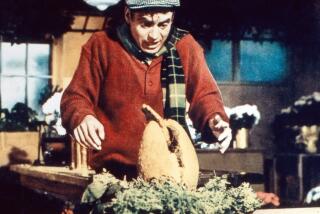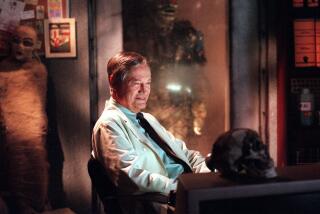Charles B. Griffith, 77; wrote ‘Little Shop of Horrors,’ other Corman films
- Share via
Charles B. Griffith, a screenwriter and director best known for writing low-budget Roger Corman movies, including “The Little Shop of Horrors” and “The Wild Angels,” has died. He was 77.
Griffith died Friday at his home in San Diego, said his cousin, Ron Fellows. The cause of death has not been determined.
In a Hollywood screenwriting career that began in the mid-1950s, Griffith wrote more than two dozen films. Many were directed by Corman, including “Attack of the Crab Monsters,” “Not of This Earth,” “A Bucket of Blood,” “Teenage Doll,” “Creature from the Haunted Sea” and “Rock All Night.”
“Griffith’s scripts were very imaginative and often quirky and kind of subversive, and when you look at any list of Roger Corman’s early pictures, those were the ones that put Corman on the map,” said Tom Weaver, a science fiction and fantasy film expert.
Griffith’s most memorable screenplay may be “The Little Shop of Horrors,” the outrageous black comedy about a dimwitted flower shop flunky named Seymour who breeds a giant man-eating plant.
The 1960 film is also remembered for Jack Nicholson’s small role as a masochistic dental patient.
Even Griffith got into the act, playing several uncredited characters, including a screaming dental patient and a burglar. He also provided the voice of the carnivorous plant, Audrey Jr., whose signature line throughout the movie is “Feed me!”
Although only moderately successful at the time, “The Little Shop of Horrors” became a cult favorite that Corman has said enhanced his reputation in Europe.
A musical version by Howard Ashman and Alan Menken became one of off-Broadway’s biggest hits in the 1980s and was followed by a 1986 feature film musical version directed by Frank Oz. The “Little Shop of Horrors” stage musical also ran on Broadway in 2003 and 2004.
Corman was out of the country and unavailable for comment Tuesday. But in discussing his career in the ‘50s in his 1990 autobiography “How I Made a Hundred Movies in Hollywood and Never Lost a Dime,” he referred to Griffith as his “main writer.”
Jonathan Haze, who appeared in numerous Corman films and played Seymour in “The Little Shop of Horrors,” introduced Griffith to Corman in 1954.
“He was very creative. He wrote really funny dialogue, and he was fast -- really fast,” Haze said of Griffith’s screenwriting skills.
“He would write a screenplay in a couple of weeks,” Haze said. “Chuck was very good and very good for that time in film history. He was an innovator. He thought up those really funny, really squirrelly ideas -- like the plant that eats people.”
Haze recalled that there were only two days of principal photography on “The Little Shop of Horrors” and three nights of second-unit work supervised by Griffith and actor Mel Welles. Those exterior scenes were shot on skid row in downtown Los Angeles, he said, “and those were real bums we used. We were paying them 10 cents a walk-through to walk through a scene.”
Griffith’s first big-screen credit was the Corman-produced and directed “Gunslinger,” a 1956 western co-written with Mark Hanna about a female sheriff played by Beverly Garland.
In an interview with Fangoria magazine in 1981, Griffith said that he wrote science fiction and westerns at the time because those were the kind of movies that everyone was making.
“And I was lazy,” he said. “Instead of trying to write an A-picture and sell it on the market, I’d just go back and get another assignment from Roger.”
His writing credits include director Paul Bartel’s 1975 action film “Death Race 2000.” He directed half a dozen films, including the 1976 Corman-produced comedy starring Ron Howard, “Eat My Dust.” Griffith also wrote that script.
He was born in Chicago on Sept. 23, 1930. His grandmother was Myrtle Vail, a vaudevillian who later created the popular 1930s and ‘40s radio serial “The Story of Myrt and Marge,” in which she played Myrt. Griffith’s mother, Donna Damerel, played Marge.
Griffith, who began writing when he was 10, arrived in Hollywood in the early ‘50s to help his grandmother write scripts for a failed attempt to move her radio show to television.
He is survived by his wife, Marmory James; his daughter, Jessica Heeps; and four grandchildren.
--
More to Read
Only good movies
Get the Indie Focus newsletter, Mark Olsen's weekly guide to the world of cinema.
You may occasionally receive promotional content from the Los Angeles Times.









